4 Best Nuts and Seeds for Managing Diabetes
Top Picks for Blood Sugar Control
Living with diabetes requires thoughtful dietary choices to help manage blood sugar levels and reduce the risk of associated health complications. While many foods offer nutritional benefits, certain nuts and seeds stand out due to their unique properties that can aid in diabetes management.
Incorporating specific nuts and seeds into one's diet can be a practical and delicious way to support overall health and well-being for those with diabetes. This article will explore four of the best options, highlighting their key benefits and how they can fit into a balanced dietary plan.
1) Almonds
Almonds are highly beneficial for people managing diabetes. They are rich in fiber, which helps regulate blood sugar levels. Their low glycemic index makes them suitable for maintaining stable glucose levels.
Almonds are also a good source of healthy fats and protein. These nutrients contribute to overall metabolic health and can help reduce the risk of cardiovascular disease, a common concern for diabetics.
Incorporating almonds into meals is simple. Adding chopped almonds to oatmeal or yogurt can enhance both flavor and nutrition. Almond butter on whole grain toast is another easy option.
Almonds offer additional health benefits such as improving cholesterol levels. Eating a handful daily can provide essential vitamins and minerals like magnesium, which is vital for insulin function.
2) Chia Seeds
Chia seeds are renowned for their high nutrient content, making them a great option for diabetes management. Rich in fiber, they help slow the release of glucose into the bloodstream, which can aid in stabilizing blood sugar levels.
A single ounce of chia seeds contains about 4 grams of protein, including all nine essential amino acids. This protein content supports muscle maintenance and provides a feeling of fullness, which can be beneficial for weight management.
Additionally, chia seeds are an excellent source of omega-3 fatty acids. These essential fats contribute to heart health, a crucial consideration for individuals with diabetes who are at a higher risk of cardiovascular disease.
Chia seeds can easily be incorporated into various meals. Adding them as a topping to yogurt, smoothies, or oatmeal is a simple way to boost nutritional intake. They can also be used in baking or made into energy balls with nuts and dates for a convenient snack.
Their versatility and health benefits make chia seeds a valuable addition to the diet of those managing diabetes.
3) Walnuts
Walnuts are an excellent choice for individuals managing diabetes. They are rich in omega-3 fatty acids, particularly alpha-linolenic acid (ALA), which supports cardiovascular health—an important consideration for those with diabetes.
The healthy fats in walnuts can help improve lipid profiles by lowering levels of LDL cholesterol. This, in turn, helps reduce the risk of heart disease.
Additionally, the fiber and protein content in walnuts assist in managing hunger and stabilizing blood sugar levels. This makes them a valuable component of a diabetes-friendly diet.
Studies suggest that walnut consumption is associated with a reduced risk of type 2 diabetes, especially in women. This points to potential benefits that stretch beyond just immediate blood sugar control.
Walnuts can be easily incorporated into various meals and snacks, providing a tasty and nutritious option that supports overall health for those with diabetes.
4) Flaxseeds
Flaxseeds play a crucial role in managing diabetes due to their high fiber content and beneficial omega-3 fatty acids. These nutrients are essential for maintaining stable blood sugar levels.
The soluble fiber in flaxseeds helps slow down the absorption of glucose, reducing sudden spikes in blood sugar. This can be particularly beneficial for individuals with type 2 diabetes.
Clinical studies have demonstrated that incorporating flaxseeds into the diet can lead to significant reductions in blood sugar levels. A study involving 29 people with type 2 diabetes found a 19.7% reduction in baseline blood sugar after consuming 10 grams of ground flaxseed powder daily for a month.
In addition to their blood sugar management benefits, flaxseeds can contribute to weight control. Despite being calorically dense, studies have shown that flaxseeds can help reduce waist circumference, which is beneficial for overall metabolic health.
Moreover, flaxseeds are rich in lignans, which have antioxidant properties. These compounds can help reduce inflammation and improve overall cardiovascular health, a common concern for diabetes patients.
However, it is important to consume flaxseeds in moderation, as they can interfere with thyroid function at high doses. Adding a moderate amount to the diet provides numerous health benefits without significant risks.
Nutritional Benefits of Nuts and Seeds for Diabetes
Nuts and seeds offer numerous nutritional benefits that can support diabetes management, including their rich content in fiber, healthy fats, and essential vitamins and minerals.
High Fiber Content
Nuts and seeds are high in dietary fiber, which helps regulate blood sugar levels.
Almonds are particularly high in fiber, providing about 3.5 grams per ounce. Increased fiber intake aids in slowing down the absorption of sugar into the bloodstream, which can help with glycemic control. Flaxseeds offer an even higher fiber content, with around 7 grams per ounce.
Chia seeds are another excellent option, offering a similar fiber content to flaxseeds. Incorporating these high-fiber foods into the diet can help manage diabetes by reducing blood sugar spikes after meals.
Healthy Fats
Nuts and seeds provide healthy fats, which are crucial for heart health and diabetes management.
Walnuts are rich in omega-3 fatty acids, which help reduce inflammation and support heart health. Almonds contain monounsaturated fats, known to improve insulin sensitivity and lower bad cholesterol levels. Pumpkin seeds also offer a good balance of omega-6 fatty acids and monounsaturated fats.
These healthy fats provide sustained energy and help in maintaining steady blood sugar levels. Consuming healthy fats from nuts and seeds may reduce the risk of heart disease, a common complication of diabetes.
Essential Vitamins and Minerals
Nuts and seeds are packed with essential vitamins and minerals that support overall health.
Magnesium, found abundantly in cashews and sunflower seeds, is vital for insulin function. Vitamin E, present in high amounts in almonds and sunflower seeds, acts as an antioxidant, protecting cells from oxidative stress. Zinc, found in pumpkin seeds, supports immune function and aids insulin production.
Additionally, selenium in Brazil nuts offers potent antioxidant properties, essential for those with diabetes. These nutrients collectively support metabolic processes and the management of diabetes complications.
Impact of Nuts and Seeds on Blood Sugar Levels
Nuts and seeds play a crucial role in managing blood sugar levels due to their low glycemic index and their capability to slow carbohydrate absorption. These features make them particularly beneficial for individuals with diabetes.
Glycemic Index
The glycemic index (GI) measures how quickly foods raise blood sugar levels. Nuts and seeds generally have a low GI, meaning they cause a slow and gradual increase in blood sugar.
For instance, almonds and walnuts have GI values close to zero, making them an excellent choice for maintaining stable glucose levels. Chia seeds and flaxseeds also fall into this category, as their GI is very low.
This low GI is attributed to the high presence of healthy fats, fiber, and protein. These components work together to ensure that glucose is released slowly into the bloodstream, helping to avoid spikes.
Slow Carbohydrate Absorption
Nuts and seeds slow down carbohydrate absorption, preventing rapid increases in blood sugar levels. This is particularly beneficial for individuals with diabetes.
For example, almonds contain a balanced mix of healthy fats, protein, and fiber. These elements slow the digestive process, ensuring carbohydrates break down gradually. Chia seeds also offer high fiber content, which forms a gel-like substance in the digestive tract, slowing sugar absorption.
Peanuts, while technically legumes, show similar benefits due to their composition. Walnuts, rich in omega-3 fatty acids, also contribute to slower carbohydrate breakdown, enhancing blood sugar control.
Incorporating Nuts and Seeds into a Diabetic Diet
Incorporating nuts and seeds into a diabetic diet can help manage blood sugar levels and provide numerous health benefits. Below are suggestions on portion control and healthy snack ideas to help integrate these nutritious foods into daily meals.
Portion Control
Managing portion sizes is crucial when adding nuts and seeds to a diabetic diet. While these foods are nutrient-dense, eating too much can lead to excessive calorie intake. It is generally recommended to consume about 1 ounce, or a small handful, of nuts per day.
Using a food scale can help accurately measure portions. Breaking down servings into pre-portioned bags or containers can also prevent overeating. It’s important to maintain variety by including different types of nuts and seeds over the week to benefit from a range of nutrients.
Healthy Snack Ideas
Nuts and seeds make excellent snacks due to their protein, healthy fats, and fiber content. Pairing them with other nutritious foods can create balanced snacks that help stabilize blood sugar levels. For instance, combining raw almonds with a small apple offers a good mix of fiber and protein.
Other snack ideas include a mix of walnuts and Greek yogurt, or a handful of sunflower seeds with cucumber slices. For a simple trail mix, combine almonds, pumpkin seeds, and a few raisins. Nut butters, such as peanut or almond butter, spread on whole-grain crackers or celery sticks, also make for convenient and healthy snacks.



